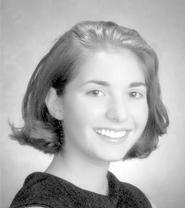
Erica Fultz '08 (Carlisle, Pa.) is a foreign languages major. But in her case that does not only mean that she can say, "two beers, please," or "where's the bathroom?" in three languages; for Fultz, her major gives her a chance to investigate the underpinnings of those languages. A former Freeman recipient, Fultz returns to campus this summer on an Emerson grant to work on a project entitled "A Generative Linguistical Approach to Japanese Verbal Nouns."
The "fascinating concept" of generative linguistics argues that, as Fultz explains in her grant proposal, "languages are a matter of innate knowledge, not learning via memorization as many teachers would claim." The rules of grammar, organization, self-expression are "hard-wired" into everybody, no matter what language they speak as they grow up. There are some concepts which are universal to every language, such as lexical categories (nouns, verbs, adjectives, etc.). Fultz proposes to study university lexical categories, particularly the Japanese grammatical structure classed as verbal nouns. These seem to belong to two categories, that of noun and that of verb, and behave as both.
The central problem is, as Fultz's project advisor Assistant Professor of Japanese Masaaki Kamiya describes it, "If we assume that human beings are identical with respect to interpretations…why does Japanese have an adjectival noun that is not found in other languages?" Fultz herself says that her project is an attempt "to prove that a supposedly 'unique' aspect of the Japanese language, verbal nouns, is really not unique. This will prove the main theory of Generative Linguistics, that all languages are derived from the same universal grammar."
When asked how she will be conducting research, Fultz answers, "literature and deep thought!" Fultz is working with two linguistics texts, Chomsky's Universal Grammar by V.J. Cook and Introduction to Government and Binding Theory by Liliane Haegeman, as well as her own knowledge of Japanese. Kamiya, who also acted as her Freeman advisor, specializes in syntactic categorization.
Fultz and Kamiya's work last year was also based on categorization; Fultz researched the history of the adjectival case in English and compared it to the development of adjectival case in Japanese. As Fultz explains, her real interest is formal linguistics, and her best chance is to study it during the summer (Hamilton does not have a linguistics department). She hopes to use this work on generative linguistics as a beginning for her senior thesis, which will link the four languages she studies.
Fultz "loves" doing summer research – it "certainly beats out waiting tables all summer" – although she is somewhat apprehensive about finding the concrete evidence she wants. "It is not something one can just find in a book," she explains.
After Hamilton, Fultz hopes to continue her relationship to Japanese by teaching English in Japan or becoming an interpreter/translator. Her work this summer is funded by the Emerson Foundation Grant Program, which allows students significant opportunities to work collaboratively with faculty members, researching an area of interest.
-Lisbeth Redfield
